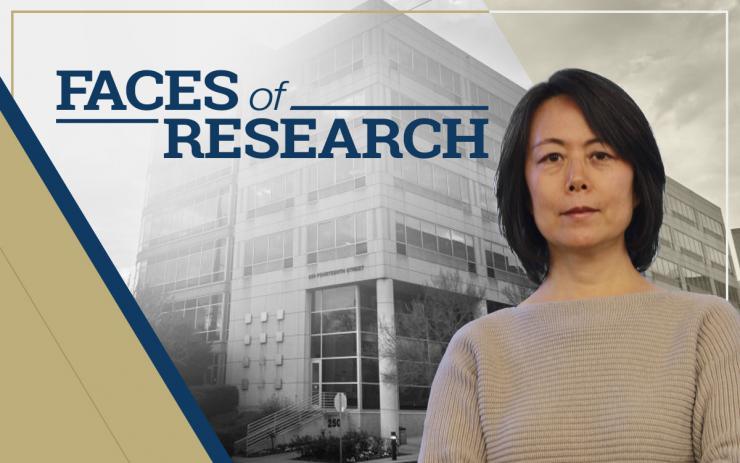Faces of Research: Meet Judy Song
Apr 06, 2022 — Atlanta, GA

What is your field of expertise and why did you choose it?
I’m a senior research engineer at The Intelligent Sustainable Technologies Division (ISTD) at Georgia tech Research Institute (GTRI), where we develop innovative technology systems to enhance the productivity and competitiveness of Georgia’s agriculture and food processing industry. As a team member in Chem-Bio sensing branch, we develop state-of-the-art sensors based on nanotechnology, chemical and biological optical sensing principles and GCMS volatile organic compounds profiling, to detect plant disease, determine chicken egg fertility, detect toxic chemicals in the environment, and ensure food safety by identifying bacteria outbreak.
I grew up in a city where coal was the major energy resource. Consequently, the gray sky, the smoky air, and the dust in winter filled of my childhood memories. I was always wondering, ‘what’s in the air?’ One of the functions of chemical sensors is to analyze the environment and to detect which substances are present and in what quantity. When I first started my research career at the Center for Ocean Technology at the University of South Florida, my task was to develop an electrochemical sensor for detecting explosive residues under the sea. I was thrilled by the assignment, and I knew this is my lifetime pursuit.
What makes Georgia Tech research institutes unique?
Founded in 1934 as the Engineering Experiment Station, GTRI thrives on solving some of the most challenging problems facing government and industry across the nation and around the globe. ISTD, where my lab is located, is a unique research unit of GTRI. ISTD works collaboratively with university and industry partners on projects involving robotics, advanced sensors, environmental treatment, and food safety technologies. At ISTD, we go beyond generating ideas. We help customers develop commercial products, build prototypes, and conduct real-time, real-scenario performance testing. Our goal is to transition technologies from concept to commercialization, as quickly and economically as possible which really make our daily work challenging and exciting!
What impact is your research having on the world?
My recent research focus is on developing advanced sensing technologies in agriculture. One interesting area is to “listen to” the signal that plants silently send to us. We develop technologies to collect volatile organic compounds (VOC) that metabolically emitted from different plant organs such as flowers, fruits, and leaves, or produced when plants under biotic stress, such as disease infection, pest attack; or abiotic stress, such as overheating or water stress. Our team has developed novel tools to detect pre-symptom plants under pathogen attack, including peach tree root rot disease detection and early detection of Phytophthora blight and fruit rot on pepper and cucurbit crops, based on the analysis and interpretation of the VOC patterns collected from these plants. These techniques have the potential to sensitively detect the stress — both abiotic and biotic — and typically before stress symptoms appear. This early detection would provide a natural and eco-friendly solution to defend plants from environmental stresses, fight herbivores, protect from pathogens, and to enhance crop yield and production.
Another interesting research area worth mentioning is that we are developing new techniques for egg fertility monitoring and chicken sexing for poultry hatcheries, based on the VOC patterns emitted from hatching eggs. While approximately 180 million unhatched incubated eggs are wasted yearly, these non-hatching (non-fertile) eggs have useful applications as commercial table eggs or low-grade food stock if they can be detected early and isolated accordingly, preferably prior to incubation. The non-destructive VOC analysis approach is a promising technology to assist with early chicken egg fertility identification problems. In the meantime, the abundant VOC profiles of the eggs containing female and male embryos could also be encoded and differentiated, therefore the unfavorable male hatching eggs could be saved and used in other applications.
What do you like to do in your spare time when you are not working on your research or teaching?
I am a big fan of my 8th grader’s soccer team — both school and club teams. Watching them chasing each other on the field, encouraging each other, fighting together until the last minute, and then walking with heads and shoulders hanging down after a loss or jumping in the air when one of his teammates make a beautiful score. The time spent with them feels so wonderful! I also enjoy training and running marathons when I am free; it really keeps me alive physically and spiritually!




